 A chance vacation in Grenada in her youth convinced Maria she would be coming back. Sure enough, after a long career in real estate, she and her husband are enjoying their golden years in this beautiful and welcoming Caribbean island.
A chance vacation in Grenada in her youth convinced Maria she would be coming back. Sure enough, after a long career in real estate, she and her husband are enjoying their golden years in this beautiful and welcoming Caribbean island.
Tell us a little about your background…
I was born and raised in Hungary during World War II. My mother was English/Austrian, my father Hungarian. We left Hungary during the 1956 revolution, spent 1½ years in Germany, and moved to Chicago in 1958. My father was a cardiologist and came to Chicago at the invitation of a professor who was familiar with his research work. I graduated college at the University of Illinois with a degree in political science and later received a Masters degree in Social Work (MSW) from Loyola University.
What is your next act? Tell us about what you are doing and what you love about it.
In 2013, my husband Richard and I moved to the small Caribbean island of Grenada. I love the natural beauty of the island, the climate, which is tropical but with the steady trade winds always pleasant, and the lack of pollution. I love the infinite variety of foods, grown sustainably by small farmers and sold at the local market.
I love the fact that there’s no crime to speak of—with a population of 105,000, there are about 300 people in prison, and these prisoners run a small farm for their own food and to sell some as well. There is death penalty on the books but no one has been executed since 1983. The political situation is stable.
I love the sense of peace. And, more than anything else, I love the sweet, gentle, welcoming people of Grenada.
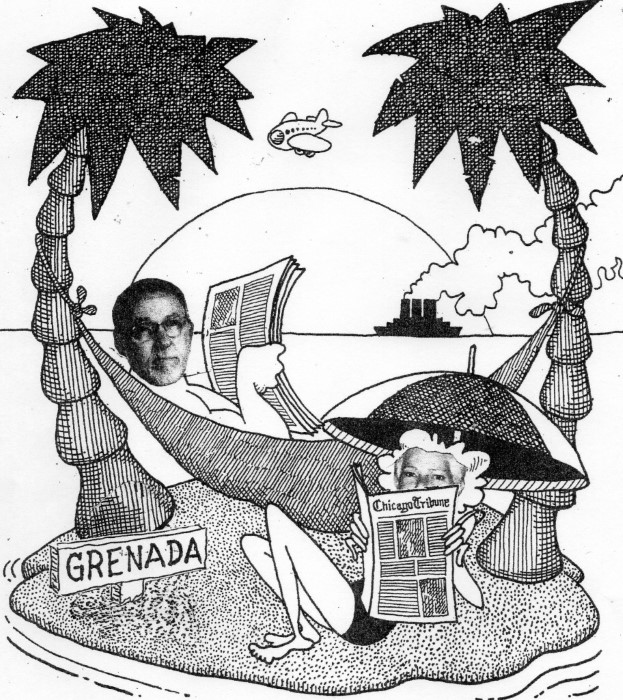
Graphic Dick made of the two of us in Grenada
How did you come to choose Grenada?
The seed was planted all the way back in 1968. I was about to start graduate school for my MSW and was facing lots of hard work and limited finances. I had saved some money in anticipation of doing some traveling. I asked my work colleagues to recommend a unique vacation and, of the many suggestions, a Windjammer cruise among the West Indian islands was the most intriguing.
I had never been on a sailboat of any kind and had only a vague idea where the West Indies were, but the gorgeous photographs my friend showed made the decision easy. That August, I flew to Antigua, booked into a small hotel, met my cruise mates, and our very attentive captain, Peter Davies, and off we sailed.
By the third day of the cruise, I had fallen in love with the lush islands as well as our boat’s captain and he announced that he was going to marry me—we did, in fact, get married. Reactions to my announcement that I was to marry a ship’s captain whom I had known ten days ranged from “Oh, how romantic!” to “Are you completely out of your mind?” I finished graduate school, in June of 1970, he left Windjammer cruises, and we settled to good careers in Chicago.
A year later, while Peter was conducting a sailing class in Chicago, he met a man who knew of a wealthy industrialist who had just bought a large Nova Scotia sailing schooner, was converting it for chartering, and was looking for an experienced cruising captain to run cruises out of Grenada. Peter and I discussed it and decided to accept the offer to run Sundowner. The reaction to this announcement was akin to the one that greeted my marriage. Leave a promising career to do something I had no clue about?
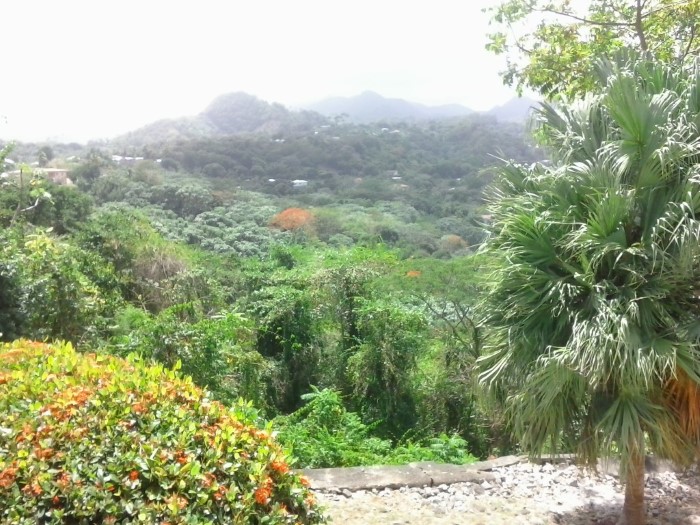
mountain view of Grenada
We moved to Grenada after in October of 1972. At the time, we had no idea how long we’d be doing this but it appeared to be a long-term job. It was fabulous fun as well as hard work. I learned to love the islands and the gentle, sweet people of Grenada. One day, after we’d been running the Sundowner for five months, we were sailing in waters with inaccurate charts and ran aground on a reef. This type of thing happens fairly regularly as charts are often old and not updated with any regularity. The boat was eventually scrapped.
We decided to go to England, as Peter is English and had been away many years and his parents were getting older.
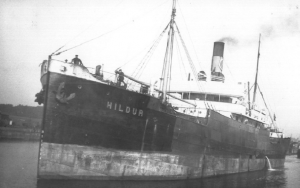 The next adventure was running a coasting freighter, Hildur, which we bought in Denmark and operated carrying general cargo in the Baltic and North Sea. This was a very different world with pancake ice in the Norwegian fjords, 22 hours of daylight in the summer and 19 hours of darkness in the winter. Yet, the scenery was as spectacular, the seafaring folk as congenial as anywhere.
The next adventure was running a coasting freighter, Hildur, which we bought in Denmark and operated carrying general cargo in the Baltic and North Sea. This was a very different world with pancake ice in the Norwegian fjords, 22 hours of daylight in the summer and 19 hours of darkness in the winter. Yet, the scenery was as spectacular, the seafaring folk as congenial as anywhere.
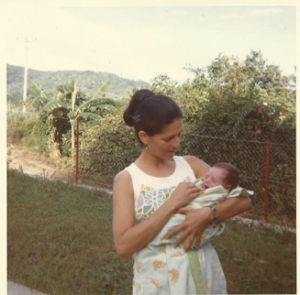
With Tim, as a baby
This endeavor was cut short by my pregnancy. So now, where to go have the baby? England? US? Grenada? After some deliberation, Grenada won. We had rented a small apartment while chartering and I was going to stay there until a house was found. My husband stayed in Europe, I went to Grenada where a family who had been associated with Sundowner took me under their wings, found me a house, made sure I had all I needed, kept me company and, when the time came, took me to the clinic to have my a son, Timothy, born October 3rd 1973. My husband followed six weeks later.
After 18 months, we sold the freighter but now faced another decision as to where to go and how to earn a living. I will never forget leaving Grenada, crying, vowing that I would return—I didn’t know when but this is where I wanted to live.
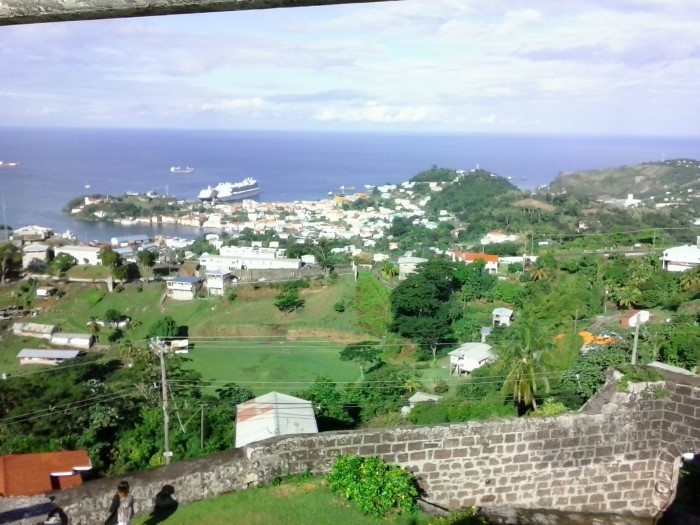
VIEW OF GRENADA
What happened next?
We returned to England. When, after four years, my marriage disintegrated, my son and I returned to Chicago. I had no job and no place to stay; my best friend housed us until both were secured; I returned to the profession of social work for which I had originally trained. I obtained a position at Illinois Masonic Hospital as a social worker in their program working with developmentally disabled children and their families.
Social work became confining, a bit boring—too many forms and regulations—so I began to think about what I could do next. A neighbor was a Realtor and suggested that, since I liked working with people, I give his profession a try. I became a licensed Realtor in 1989, at the age of 48, and practiced real estate for 25 years. During that time, my son Tim and I regularly visited Grenada. He fell in love with the island too.
Back in 1983, when I was 41, I’d met a man, Richard Nuscher, who was to become my husband. When we decided to marry, I told him that I was going to retire in Grenada and that I hoped he’d like it, because if he didn’t, we would spend much of our retirement apart. Fortunately, when he came with Tim and me to Grenada, he fell in love with it as well. We were married in 1984 and in 1985 bought a piece of land in Grenada for our eventual retirement home.
For the next 28 years everyone who knew me heard ad nauseam of my eventual retirement to Grenada. I never let go of the dream.
When we finally moved to Grenada in 2013, much had changed but the essentials hadn’t.
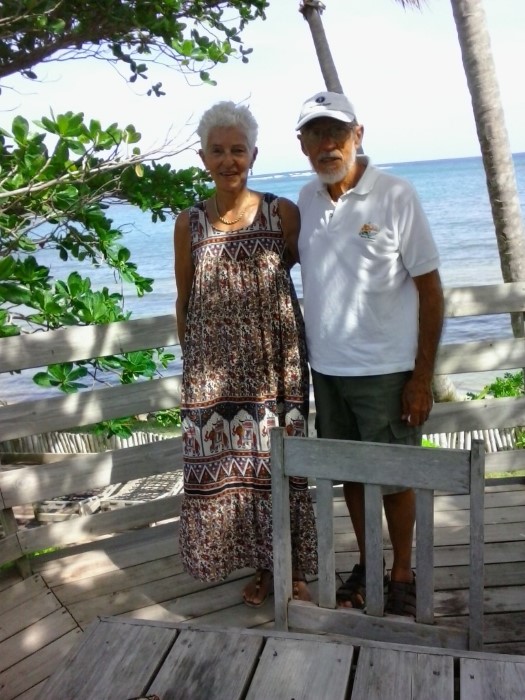
With my husband, Dick
How did you prepare for your move?
We prepared by looking for rentals in Grenada and hiring a property manager to look after our house in Chicago, thinking initially that we’d spend October to May in Grenada each year and summers in Chicago. We kept all our banking in Chicago.
We secured travel visas for Grenada, which are relatively easy to obtain and are renewable for a fee for up to a year at a time. We also decided to have our annual dental and physical checkups each year when we returned to Chicago. We hired a mail-forwarding business to handle our mail as the US Postal service only forwards mail for six months.
It took us just a month to find a spectacular and reasonable place to rent, from landlords who have since become friends.
Our plans changed in 2014, when we decided to live full time in Grenada. Paying rent in Grenada as well as mortgage and property management fees in Chicago was stretching our budget too thin. At first, we thought of selling our home in Chicago and buying a condo in Chicago and a house in Grenada with the proceeds. In mulling over this plan, we considered the likely increase in condo fees, the uncertainty of building maintenance by the condo association, etc. and decided against this path.
By then, we also realized that the home we wanted in Grenada would require most of the proceeds from the sale of our Chicago home. Lastly, we realized that our nine grandchildren would shortly be scattering geographically as they started attending college and that a place in Chicago would not allow us to see them all at once anymore. We felt it would be better to help them visit us and experience our wonderful island. The final decision was easy but it took time to reach. So we sold our home in Chicago and have been looking for a home to buy in Grenada.
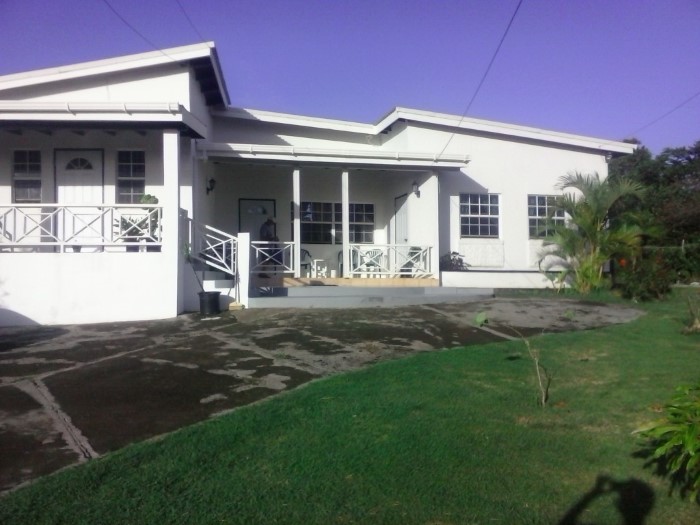
Our current home in Grenada
How hard was it to leave the US and your family and friends?
It was hard leaving Chicago, especially family. At that time we had four children—my son Tim had died unexpectedly of a heart attack—and nine grandchildren. Friends were very supportive, if a bit envious. Luckily, we get plenty of visitors! We’ve had two of my best friends come as well as two grandsons. Our eldest daughter Grace, her 3 children and Tim’s 2 children are coming in January of 2016.
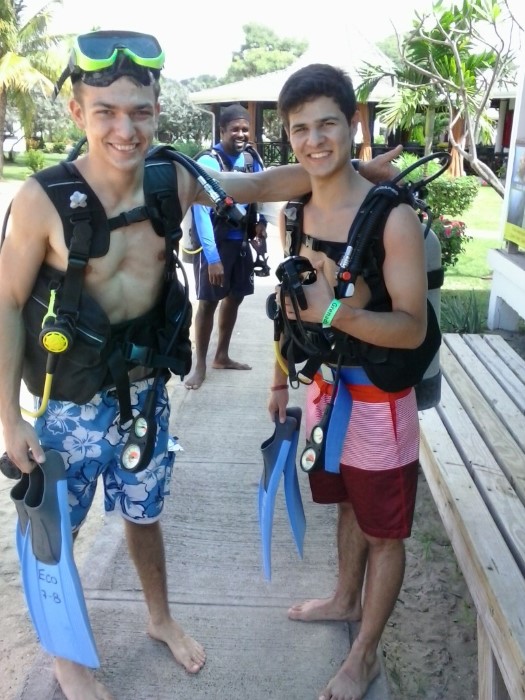
Our grandsons on a visit
What challenges did you experience first settling in Grenada?
The challenges were figuring our transportation, getting re-acquainted with the foods that are quite different (including fruits and vegetables), figuring out where to shop, and getting a doctor, dentist, and hairdresser.
The biggest challenge has been purchasing property in Grenada; it’s been a frustrating, fascinating experience. While there are realtors here—including Re/Max, C21, and Coldwell Banker franchises—there is no Multiple Listing Service, no licensing law, no Code of Ethics, no exclusive listing agreement, so a seller will often list with three or more realtors at different prices. Since cooperation among listing and selling agents is catch as catch can, anyone can sell anything and represent both buyer and seller; it’s pretty wild. There is no law mandating seller disclosure regarding the condition of the property or visible or latent defects and there’s no guarantee that the survey is correct, so it’s pretty much caveat emptor (buyer beware).
Once you’ve identified a property, you send a letter to the realtor stating intent to purchase and a purchase price. That letter is presented to the seller’s attorney and, from then on, it’s the respective attorneys who handle all aspects of the transaction. While in the US, all contracts carry the concept of “time is of the essence,” that doesn’t exist here, so things move excruciatingly slowly. There are properties for sale by banks where the owner has defaulted, called “forced sales.” While our short sales or foreclosures mean the owner has lost the property and the bank will try to sell for an amount of the mortgage debt and a bit extra, here the owner retains all control of the process and the price quoted will be the highest the bank or owner think they can get away with. Most frustrating is the fact that even with an accepted offer, the owner can redeem the property at the last minute, so the deal’s off. The owner is also allowed to occupy the property up to and sometimes past closing, so the new owner may have to go through eviction procedures to obtain possession.
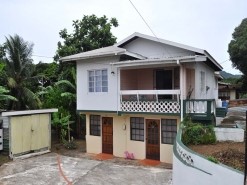
A typical house in Grenada
Prices bear no relationship to anything; since there’s no MLS (Multiple Listing Service), there’s no reliable data to assess the value of a given property. So offering 30%, 40% or more off asking price isn’t viewed as an insult. The home we’re now in the process of purchasing was listed with a relatively reasonable price but we offered 15% below asking and the offer was accepted without negotiation.
The upside is that there are many properties to choose from, including homes with ocean view, valley view, mountain view, town or country settings. There are very few unattractive locations on the island .The key to a successful home purchase is a good realtor and a good attorney and I am fortunate to have both.
Foreigners are able to purchase property but have to apply for an Alien Land Holders’ Certificate, which necessitates gathering police certificates both from the police of the last place lived in the country of origin and Grenada, a bank certificate stating that all funds are legitimate, character references (one professional and one personal), plus an application fee of about US $300. This process can take up to three months. Again, the upside is that Grenada is super vigilant against money laundering and drug lords trying to hide on a small island.
Grenadians are absolutely wonderful in welcoming people here for a short visit or for good. I’ve never encountered anything the least bit unpleasant. My social circle consists of Grenadian and English friends we’ve known since 1971, our landlords (Grenadian and Bajan—from Barbados), our Grenadian attorney (and her Ukranian husband), our Grenadian realtor (and her American husband), and a lovely Canadian couple who live close by and have lived in Grenada for 13 years.
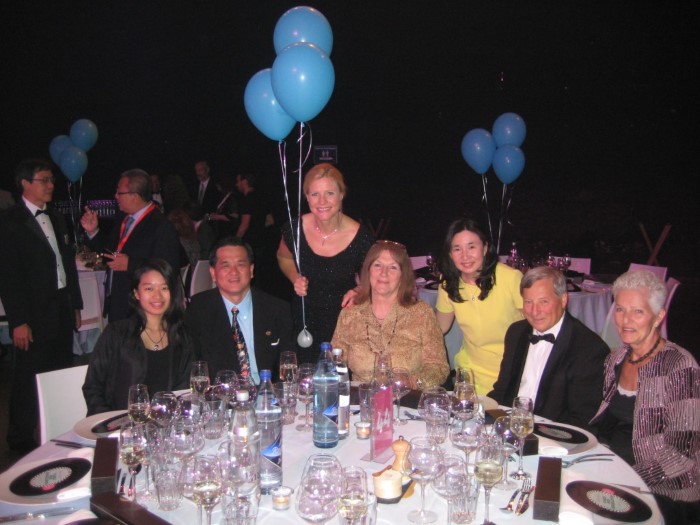
Tell us more about the island of Grenada and what is has to offer US retirees?
Grenada is a very small, unspoiled island, some 25 miles long and 12 miles wide, with a population of 105,000.00. English is the language. The island has been independent since 1974 and has a parliamentary democracy.
Grenada’s history is very long; Columbus discovered the island, originally inhabited by the Carib Indians. The French and English fought for possession of the island between the late 16th and early 18th centuries, the English finally prevailed. The island was a major producer of sugar and rum, later spices and cotton. The slaves who were brought in to work the sugar plantations were freed in 1834. Indentured laborers from India then did the work the slaves had done.
What the island offers US or any other retirees is spectacular natural beauty, no pollution, no crime to speak of, excellent housing stock to choose from, a welcoming, sweet population, and a peaceful environment. There’s an incredible variety of activities, such as diving of all kinds, nature hikes in the rainforest, sailing, historical sites, beaches and bays and coves—you can almost pick one and call it your own. There are many great restaurants, clubs, pop concerts, sporting events (soccer and cricket are the main sports here).
There is the University of the West Indies, a fully accredited university attended by students from all over the world. There are shopping malls and for those, like me, who refuse to buy cheap Chinese goods on principle, there are very talented tailors, reasonably priced.
The people here now are a mixture of African, East Indian, Middle Eastern, descendants of the original white planters, and an expat community of English, American, Canadian, German, and French. There is also a large yachting community of people who live on their boats and stay here for varying amounts of times.
What are your favorite places to go on Grenada?
As many times as I have done a tour of the island (though the island is small, there are few straight or level roads, so a tour can easily take a whole day), I never tire of doing it again. The sights are spectacular, including mountains, valleys, and the seashore from the rugged Atlantic to the placid Caribbean Sea. I love to go out over the reefs in a glass bottom boat and I love to have lunch at Belmont Estate, an old sugar plantation that’s now a museum, restaurant, and shopping venue.
My hubby and I have our “own” beach just a short walk from our home, small, with rarely more than three or four people there. The village of Gouyave up on the west coast of the island has a fish fry every Friday where vendors sell local delicacies as well as fish and lobster. There are big crowds and lots of loud music—it’s a fun thing to do.
Sometimes just sitting on the front porch watching the sea, the birds, and the lizards and doing nothing is great too.
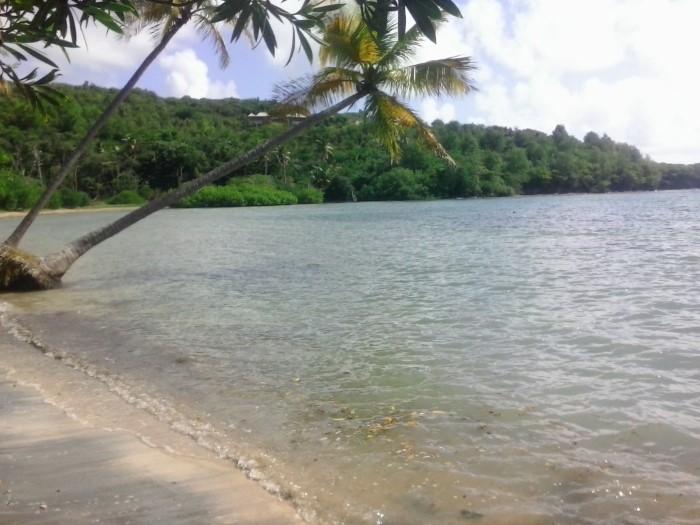
Dick and my “private” beach
What is your advice to those considering retiring abroad?
When you choose where you want to spend the rest of your life, think out of the box. Living abroad has many challenges but the adventure is well worth the effort. Choose a place you visited or worked or wish you had experienced.
Then go to the place where you think you want to retire, stay as long as possible, and figure out who your social circle might be, how to meet people, as well as what changes you’ll have to adapt to in terms of cuisine and wardrobe.
Research banking regulations, expected taxation (none for retirees in most places), health care options, and laws regarding purchasing property. Do some shopping when visiting and look at costs for housing. Have an approximate idea of a budget for living where you’ve chosen.
If you’re considering Grenada, you’ll find the banking system here is excellent. The currency is the Eastern Caribbean Dollar; the exchange rate fluctuates but is usually EC$2.70 to the US Dollar. The only taxes we pay are VAT, which is a sales tax charged on goods and services in Grenada, and the one-time 10% tax payable to the government by all foreigners purchasing property, as well as annual property taxes, which are very low by American standards.
One thing expats find frustrating here is that there are layers and layers of bureaucracy to wade through for just about anything: visas, sale and purchase of property, opening bank accounts, etc. While health care is good, for major illnesses or complicated surgeries, it’s probably better to go back to your country of origin.
Get recommendations for a good attorney and realtor as laws are often very different from US or European laws. I recommend mine: Leslie-Anne Seon is my attorney and can be reached at laseon@seonlaw.com. Paula LaTouche is my Realtor and can be found at www.c21grenada.com.
For additional resources, I recommend AARP; they have a ton of information about just about any topic related to this demographic. Also www.retirement-living.com and www.RetirementWeb.com. Specific to Grenada, I like www.grenadaataglance.com and www.puregrenada.com.
I also like the book by Dr. Christine Northrup: Goddesses Never Age: The Secret Prescription for Radiance, Vitality, and Well-Being.
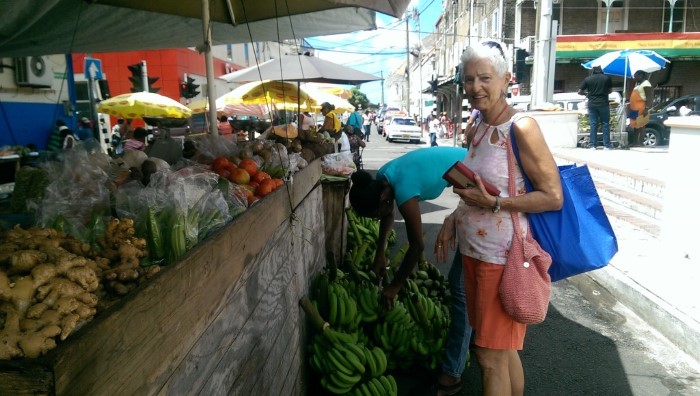
What is your daily life like in Grenada?
It varies. I write a newsletter and blog on my website, http://www.mariadavies.com/index.html with topics that interest me, like food, travel, entertaining, how to “do” retirement, as well as health and fitness. So I spend time on this two or three times a week for a couple of hours. Once a month, there’s a book exchange where you can take books you no longer want and pick up any number you want, including many in foreign languages. As I’m fluent in German, Spanish and Hungarian, finding foreign language books is a special treat for me. The EC$5.00 donation goes to charity. This is also a popular venue to visit, swap stories, enjoy a cup of coffee. The people who attend are local Grenadians, ex-pats and members of the yachting community. There’s also a German book exchange run by a couple from Berlin who settled here 5 years ago and now run a restaurant, appropriately named The Schnitzel Haus.
I communicate with family and friends from Chicago, usually via Skype, at least once a week and email with friends all over the world. I spend time on food preparation and try to make as many of my own sauces, juices, and condiments as possible. My hubby Richard and I also have a vegetable garden.
We go for walks, go to the beach, read, watch TV at night. We get all the US cable stations as well as two Canadian and a Venezuelan station. We get together with friends and love to entertain.
We have a wonderful life and are lucky to be living our dream.
Contact Maria Davies at maria@madavies.com
Website: http://www.mariadavies.com/index.html
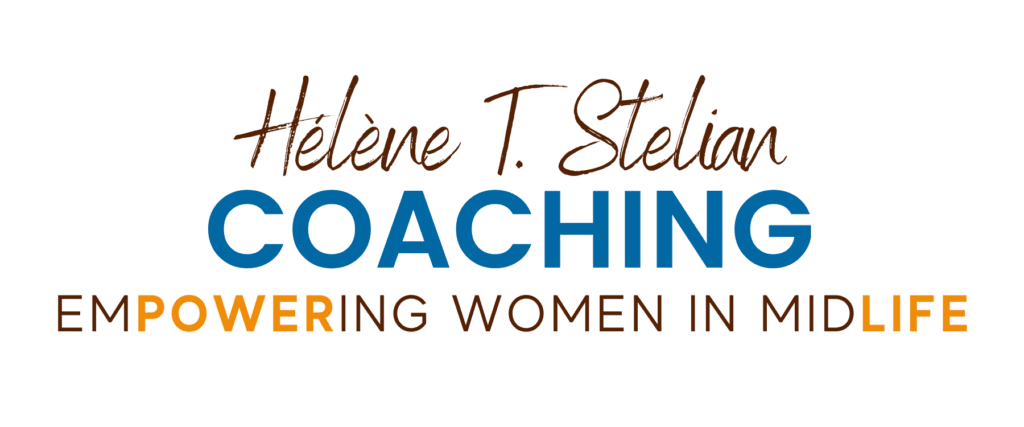
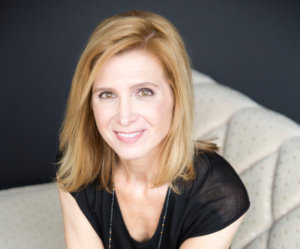




Several years ago I went on a 3 week sail in a 50 foot sailboat from Saint Vincent to Granada.It was fun sailing to all the small islands in the Grenadines. I loved Grenada and think it would be a wonderful place to live. We visited the Belmont Estates and sipped some of their fantastic tea made with cacoa. It’s interesting that the bay at St. George is actually the crater of a volcano. Great article and so informative.
Hello
My husband and I are interested in retiring to Grenada. We are coming the end of this month or beginning of November. I need to find out how to get an extension so we can stay longer than the 90 period. Can you direct me how to do this?
I would like too visit GRENADA an possibly live there in retirement